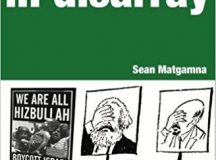IfNotNow’s support for barring the Jewish Pride flag from the Dyke March was another example of its failure to distinguish anti-Zionism from antisemitism. The left’s overall inability to make this distinction, and challenge antisemitism in its ranks, has been a key source of the progressive movement’s weakness. To overcome it, we need clearer boundaries and a new agenda for the Jewish left, argues Daniel Kalick.
Introduction: Left Antisemitism and the Challenge of Uniting Jews and the Left
The biggest challenge big-tent movements face is where to draw the line on inclusivity. Achieving a universal mission requires uniting as many people as possible, which means it’s often necessary to tolerate a number of annoying cranks.
But tolerance has its limits. And progressives must be willing to absorb painful accusations of hypocrisy or worse from political opponents, including seeming allies, whose harmful words and deeds must be opposed from time to time — lest the big tent burn down.
This is far from a simple matter. It’s not always clear who or what will do damage to a popular movement. And establishing boundaries entails political risks of the highest order. Draw the line too narrowly, and you alienate your friends. Draw it too widely, and you court enemies whose intolerance could destroy tolerance altogether, as philosopher Karl Popper noted.
Establishing boundaries is more difficult still when it comes to a complex issue like the relationship between anti-Zionism and antisemitism. Social theorist Moishe Postone has argued that antisemitism sets a particularly dangerous trap for progressives, due to its seeming anti-hegemonic nature. The appearance of ‘punching up’ to powerful Jews, in the words of writer John-Paul Pagano, muddies the distinction between an anti-Zionism that entails far-reaching criticism of Israel, on the one hand, and an anti-Zionism that’s simply antisemitism by another name, on the other. Needless to say, the difficulty of telling the difference has posed big challenges for Jews and the left.
During the two decades following the Holocaust, when the left was more sympathetic to the Jews, and towering figures like Jean-Paul Sartre expressed support for Israel’s establishment, navigating the boundary between anti-Zionism and antisemitism was less of an issue. But after the Six Day War, when the taboo of publicly criticising Israel was shattered in the West, this boundary became the site of intense political debate. As the left embraced many types of anti-Zionism, including those calling for Israel’s destruction, many Jews decried the growing ‘respectability’ of antisemitism in leftist ranks, as essayist Jean Amery put it. For anti-Zionists, meanwhile, Jews who levelled accusations of antisemitism largely did so in bad faith, to undermine legitimate criticism of Israel. The discussion has not advanced much beyond this point over the last 50 years.
The acrimonious conflict that erupted in the late 1960s divided Jews and the left, contributing to the progressive movement’s overall fragmentation and downfall in the 1970s. Prior to the Six Day War, Jews were very active in New Left organisations, making up at least 30 to 50 per cent of its ranks, according to sociologist Jack Nusan Porter. Almost overnight most departed, first to short-lived and forgotten circles of ‘Jewish radicalism,’ which married radical politics with opposition to left antisemitism, then ultimately to mainstream liberal and conservative parties. Those Jews who stuck with the progressive movement, and continued to fight antisemitism from within, did so at great cost, rendering themselves stigmatised and ‘homeless on the left,’ in Amery’s words.
What led to this divorce? Unfortunately, many left scholars overlook or downplay the role of left antisemitism. Historian Enzo Traverso’s The End of Jewish Modernity ignores it as a key factor in the breakup of Jews and the left. Political scientist Jack Jacobs only mentions it in passing in Jews and Leftist Politics. But antisemitism masquerading as anti-Zionism has had a big impact on the makeup of the left on both sides of the Atlantic. Historian Colin Schindler recounts that Communists and their fellow travellers in Europe supported or apologised for Stalin’s show trials, which were staged under the pretense of an international ‘Zionist’ conspiracy. In America, writer Louis Harap penned a robust defense of Stalin in 1953 for the readers of Jewish Life, a Communist Party organ that later became Jewish Currents, giving cover to the lie that Stalin’s show trials were merely anti-Zionist in nature, not antisemitic. In 1956, after Khrushchev revealed the depth and horror of Stalin’s antisemitic purges, three-fourths of Jewish Life’s subscribers walked away, and many more Jews departed the Communist Party altogether.
This is but one historical example of the damage antisemitism, masquerading as anti-Zionism, has caused both Jews and the left. By erasing it as an important factor in the progressive movement’s division and downfall, left scholars and activists unintentionally reproduce the problem. Further, by suggesting the relationship between Jews and the left is irrevocably over – that it ‘was a historically important phenomenon…of limited duration,’ in the words of Jack Jacobs – they inadvertently turn the two parties into enemies, locking them into some sort of permanent, metaphysical opposition.
We do not have to follow this line of thinking. While the relationship between Jews and the left is at a low point, neither party has to accept this state of affairs as fate. Building a big-tent movement that unites them is still possible, but it will take a willingness to dive head first into the conflict that led to the divorce. It will require establishing a clearer boundary between anti-Zionism and antisemitism. It will demand challenging those who cross it. And the discomfort of doing so, particularly for the Jewish left, which must take the lead, can no longer justify inaction.
IfNotNow, the Jewish Pride Flag, and the Dyke March Controversy
It’s on this front that the leadership of IfNotNow – a protest group founded by young American Jews, with the stated aim of ending Israel’s occupation of Palestinian territory – is facing a critical test, and failing.
What started as a powerful rebuke to the Jewish establishment in the U.S., with the potential to inspire a popular movement for change, has quickly descended into a divisive campaign that’s undermining its own goals and alienating most Jews, including significant portions of the Jewish left. This unraveling is due to IfNotNow’s failure to consistently challenge regressive anti-Zionist stances that masquerade as progressive ones.
Glaring missteps have started to pile up over the last year. The group gave cover to the Women’s March, whose leaders drew heated criticism for their mealy-mouthed disapproval of Louis Farrakhan. IfNotNow’s supporters endorsed Rep. Ilhan Omar’s infamous tweets as ‘criticism of Israel,’ despite the fact other leftists argued the tweets were antisemitic and Omar herself apologised. IfNotNow’s leaders bestowed an award on activist Angela Davis for her contribution to civil rights without also questioning the conspiratorial ideas Davis has propagated, including those about the ‘tentacles’ of the ‘Zionist lobby.’ And the group has maintained complete silence on Jeremy Corbyn, looking on as his supporters reduced MP Luciana Berger’s gut-wrenching decision to leave Labour to a ‘vanity exercise,’ despite the fact that her departure was due to Corbyn’s cynical refusal to take action on antisemitism.
In all of these instances, IfNotNow could have carved out a valuable, much-needed space to defend its progressive allies against right-wing smears of diabolical ‘Jew hatred,’ on the one hand, while confronting the antisemitic stances these same allies often take, on the other. It could have opposed the right’s instrumentalisation of antisemitism to undermine advocates of Palestinian justice, while chiding those advocates whose chauvinism creates fertile ground for such tactics. It could have graduated from a lazy pose that tolerates all forms of anti-Zionism, to a riskier but more fruitful attempt to distinguish authentic criticism of Israel from conspiratorial nonsense. All too often, however, IfNotNow’s members and supporters have downplayed, denied or apologised for even the most blatant forms of left antisemitism. As a result, the group’s goal of growing a big-tent movement has faded from view. Today, it seems more fixated on trolling liberal Zionists, ironically its most natural allies for ending the occupation, and inveighing against the right’s plot to ‘weaponise antisemitism’ to divide the left, mentioning nothing about the past or present division caused by left antisemitism.
This mission creep was on full display at the D.C. Dyke March in the beginning of June. In the run up to the event, which IfNotNow co-sponsored, the march organisers announced a ban on carrying the Jewish Pride flag, because it ‘looks a lot like an Israeli flag, a Zionist symbol.’ Failing to explain the contradiction between this decision and IfNotNow’s supposed non-stance on Zionism, the Dyke March went on to say that it was banning all symbols of ‘violent nationalism.’ This declaration might have been principled, except the Dyke March decided only to ban Israeli symbols, not Palestinian ones, and members of IfNotNow’s D.C. chapter initially denied entry to Jewish women who showed up with Jewish Pride flags.
In an attempt to inoculate themselves against charges of antisemitism, the Dyke March and its IfNotNow co-sponsors stressed that other, primarily religious or cultural Jewish symbols, would be permitted at the march. But by espousing a regressive form of anti-Zionism that essentialised Jewish nationalism as uniquely and inherently malevolent – by moving beyond a far-reaching critique of Israeli policies and institutions, to the stigmatisation and perversion of all expressions of Jewish national belonging – they crossed the line. And instead of defending a coherent big-tent position – for example, upholding the national self-determination of both Jews and Palestinians – the activists smeared their challengers as chauvinists, claiming they said ‘the Dyke March is anti-Semitic for taking a pro-Palestine stance.’ The activists declined to name anyone who made such a ridiculous assertion.
In the end, the National LGBTQ Task Force withdrew its support from the Dyke March; a counter protest was held by Zioness, A Wider Bridge, and the Jewish Community Relations Council of Greater Washington; and famed lawyer Roberta Kaplan, who argued in front of the Supreme Court to overturn the ban on gay marriage in America, issued a scathing rebuke. All of this was tremendously bad for the progressive movement. And if Jews and the left were more divided after the Dyke March, that’s due to IfNotNow’s missteps, not anything done by the right.
Jewish Self-Determination and the Limits of Anti-Zionism
IfNotNow’s failures at the Dyke March, its heightening of the division between Jews and the left, mark only the latest chapter in a divorce that’s nearly 50 years old. These failures are the result of deep conceptual confusion and the lack of a clear boundary between anti-Zionism and antisemitism.
This confusion results in the left’s tolerance of views that go beyond authentic criticism of Israel, to the stigmatisation and perversion of all Jewish national belonging. Today and for the last 50 years, the antisemitic disfiguration of the Jewish collective subject, its image as a purveyor of overwhelming power and violence, and its depiction as the mono-causal source of world misery, has created an intellectual climate on the left where it’s not enough to criticise or oppose the idea of a Jewish state – one must reject the idea of Jewish self-determination altogether.
The concept of Jewish self-determination, which in my view marks the proper boundary between anti-Zionism and antisemitism, is critical for the left’s ability to chart a progressive future for the region. Upholding it, rather than disfiguring it, can unlock the progressive energies of Jews and Palestinians. It can allow them to explore a range of novel political ideas that go beyond a stultified two-state solution, on the one hand, while sticking to the bounds of rational thought on the other, avoiding the pitfalls of chauvinism, nihilism, and perfectionism that mark today’s most hegemonic forms of anti-Zionism.
Yet Jewish self-determination is all too often conflated with an interrelated yet distinct notion, that of the Jewish state. All parts of the political spectrum perpetuate this conceptual flattening, which muddies the boundary between anti-Zionism and antisemitism. But the Jewish left bears particular responsibility, because it should know better.
When writer Peter Beinart defends today’s anti-Zionists against the charge of antisemitism, for example, he assumes their opposition to Jewish self-determination merely means opposition to the idea of a Jewish state. Many people have voiced valid criticism of this foundational Zionist principle, namely its legitimation of discrimination against Palestinians on the basis of Jewish ethno-religious identity. We need not adopt the discourse of ‘Jewish supremacy’ to learn from these arguments, nor do we need to overstate the scope of discrimination that’s inherent to the Jewish state principle. The point is that Beinart projects valid criticism of the Jewish state onto the anti-Zionists he defends, as if they are making his criticism.
But this is a distortion. Today’s most prominent anti-Zionists do not limit themselves to criticism of the Jewish state. Rather, they are explicit in their opposition to any form of Jewish self-determination in Israel/Palestine. What they agitate against is the recognition of Jewish national rights to collective self-government of any kind, to the point where they denounce even a bi-national solution. Far from expressing an anti-Zionism that offers extensive criticism of the Jewish state, this thoroughgoing rejection of Jewish self-determination perverts and stigmatises all forms of Jewish national belonging. In my view, it is intrinsically related to the antisemitic presupposition that Jews, coded as ‘Zionists,’ are malevolent and omnipotent, which unfortunately underwrites much of what passes for anti-Zionist and ‘anti-imperialist’ thinking today.
From this interpretive standpoint, we can better understand what has divided Jews and the left for the last 50 years. The breakup occurred not because the left engaged in far reaching criticism of Israel, including the foundational idea of a Jewish state. After all, such criticism is stock-in-trade for the Jewish political tradition, from Bundism to Canaanism, and any leftist Jew worth their intellectual salt knows its arguments back to front, relishing many of them.
Rather, the left became less Jewish because it began to tolerate positions that demanded the total capitulation of Jews. It became less Jewish because it crossed the line, moving from criticism of Israel, to the rejection of Jewish self-determination and the demonisation of Jewish national identity. It became less Jewish because it pitted the region’s hopes not against certain regressive Israeli policies or institutions, but against the existence and independence of a Jewish nation, in whatever institutional form that might take. And those Jews who refused to engage in total self-abnegation said to hell with that.
Fortunately, we do not need to rely on the narrow definition of self-determination many anti-Zionists propagate to justify their denial of self-determination to Jews. The concept of self-determination has a rich intellectual and political history that far transcends whatever certain BDS activists have to say about it. Political scientist Michael Dawson, for example, has beautifully defined it as ‘the collective ability to choose the future that has the highest likelihood of being just.’ And as democrats, we say this choice belongs to everyone who demands it.
An Agenda for the Jewish Left
IfNotNow’s missteps fit within the broader context of related failures on the left. Even as the Labour Party continues to run candidates who propagate the most blatant forms of antisemitism, Noam Chomsky has dismissed all accusations against Jeremy Corbyn as a witch-hunt. Despite no shortage of historical instances when anti-Zionism was simply antisemitism by another name, from the Slansky trial, to terrorist attacks on Jewish civilians carried out by German militants in the 1970s, to recent attempts to ban Jewish student societies on UK campuses, philosopher Alain Badiou has asserted left antisemitism is a logical impossibility, ‘an absurd oxymoron.’ And though no educated adult has ever claimed ‘any and all criticism of the State of Israel is effectively anti-Semitic,’ social theorist Judith Butler and her many followers insist on self-triumphantly defeating this pathetic straw man so clearly of their own making.
With all of these asinine formulations, we must ask ourselves: has the bankruptcy of what often passes for left thinking today ever stood so nakedly in front of us?
IfNotNow can be authentically progressive without repeating these intellectual mistakes. It can reel itself back from the brink and build a big-tent movement to end the occupation that unites Jews and leftists, including a number of self-avowed non- and anti-Zionists. To get there, it must articulate a clear boundary between anti-Zionism and antisemitism. It must educate others in the progressive movement on where to draw the line. And in concert with its allies, it must occasionally confront those who cross it.
This will not be an easy process.
IfNotNow will first have to wean itself off the gaze of the non-Jewish left; instead of merely seeking validation from others, like Jewish Voice for Peace, Jewish Voice for Labour, and similar groups, it will have to focus on understanding why many American and Israeli Jews are invested in a number of problematic policies and institutions. It will have to offer these Jews alternatives other than the false choice of BDS or Benjamin Netanyahu, neither of which are focused on ending the injustice of the occupation.
It will have to push anti-Zionists who speak in the name of equality to clarify whether they believe national self-determination is for Palestinians only, not Jews. It will need to counter anti-Zionists who justify this regressive stance by comparing Israel to apartheid South Africa, reminding them that this simplistic analogy has been rejected by even Israel’s most ardent critics. It will have to attack the overly stylised ‘anti-imperialist’ conceptual framework at the heart of such thinking, seeing it as a source of the helplessness that afflicts much of the left.
It will have to find and engage those non- and anti-Zionists who criticise the idea of a Jewish state, on the one hand, and uphold the principle of self-determination for all peoples, including Jews, on the other. It must locate and explore their common ground, pursuing innovative political ideas that satisfy the needs of both Jews and Palestinians, transcending the principle of two states for two peoples where need be, and looking to bi-national, confederal, or other institutional forms.
It will have to welcome interest in Jewish political alternatives to Zionism, while opposing the sloppy, wholesale application of dated ideologies to today’s reality. It will need to counter leftist Jews who cite the historical existence of Jewish anti-Zionisms as ‘proof’ that anti-Zionism is not or cannot be antisemitic. It will need to make such Jews understand that Bundism and Canaanism opposed the Zionist idea of a Jewish state, but they did not reject or stigmatise all forms of Jewish national belonging and self-determination, as left antisemitism does.
It will have to challenge leftists who make a distinction between ‘Zionists’ and ‘good Jews’ in order to justify hatred and violence toward the former. It will need to confront those who broadly define the term ‘Zionist’ to include not just right-wingers who support Israel’s most regressive policies and institutions, but the overwhelming majority of Jews whose sense of national belonging, solidarity with other Jews, and hope for Israel’s well-being is indeed ‘the core of their political identity.’ It will have to point out that leftists who adopt this overly broad definition of ‘Zionist’ ironically undermine, rather strengthen, the distinction between anti-Zionism and antisemitism they set out to ‘prove’ again and again.
It will have to confront leftists who uphold virtually all arguments against Jews and Israel under the banner of ‘criticism.’ It will need to elucidate, rather than collapse, important distinctions that are leveled by doing so. It will have to recognise that ‘criticism’ purporting to explain world misery through the supposed omnipotence and malevolence of ‘the Zionists’ is a form of antisemitism. It will need to loudly challenge such antisemitism wherever it exists, discarding the self-serving narrative that it only or primarily comes from the right.
It will have to defend liberal Zionists against vicious smears, recognising them as allies in the movement to end the occupation, while continuing to criticise their contradictory positions. It will have to defend Israel against demonisation, investing in its institutions as flawed but useful stepping stones to a progressive future, while continuing to fight Israel’s treatment of the Palestinians and its denial of their right to self-determination. It will need to support leaders who attempt to carve out such a position, and counter left spokesman who undermine them.
It will have to question leftists who celebrate the fact that Israel is becoming a wedge issue in the Democratic Party. It will need to point out the likelihood that many lifelong Jewish Democrats will either stay home on Election Day, or leave the Party altogether, if unqualified support for BDS becomes part of the Party platform, as it has for the Democratic Socialists of America. It will have to ask leftists agitating for this state of affairs if more Republican electoral victories, now and in the long-run, will be worth it.
It will need to protect and strengthen the space where one can oppose left antisemitism and still be a leftist, instead of letting that space be destroyed. It will have to recover and re-tell the history of leftists who fought left antisemitism in order to strengthen the progressive movement – like Jean Amery, Ellen Willis, Moishe Postone, Morris Schappes, Robert Fine, Norman Geras, Alan Johnson and recently David Hirsh – instead of letting them be erased by left scholars and activists.
In a word, IfNotNow will have to define how to incorporate both an affirmation of Jewish national identity and opposition to left antisemitism into the progressive movement’s theory and practice. It will sometimes need to confront other leftists along the way, challenging them instead of capitulating. It will no doubt be stigmatised and alienated by its seeming allies for doing so. But drawing the line from time to time, however uncomfortable and unpopular, is the price of building a successful big-tent movement. Is IfNotNow, and the rest of the Jewish left, willing to pay?






































